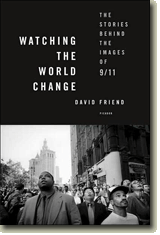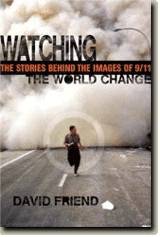« Previous · Home · Next »
March 11, 2007
"9/11," THE DOCUMENTARY - FIVE YEARS ON
It's hard to believe how much time has passed.
Five years ago this weekend, on March 10, 2002, CBS aired the documentary 9/11, hosted by Robert DeNiro. The two-hour prime-time special, chronicling one summer in the life of the Duane Street firehouse--whose firefighters were the first to arrive on the scene in response to the initial attack of September 11--was a national event. Forty million people watched the broadcast, which ran without commercial interruption. (Nextel supported the program with three public-service spots.) Sixth months later, on the first anniversary of the tragedy, 9/11 would air in 140 countries.

My friends Jules and Gedeon Naudet, French-American filmmakers residing in New York, were courageous and alert enough to continue videotaping throughout that day, that week, and into the fall. They gathered some 180 hours of footage, capturing, most critically, the impact of the first and second aircraft, along with the collapse of both towers--directly on top of them. Gedeon withstood the implosion of Tower One, the second building to fall, by jumping into the hold of a firetruck; Jules survived the collapse of the south tower by seeking refuge on a concourse escalator, then the collapse of the north tower by laying on the pavement under a police van.
It is startling to note that on a day many call the most photographed in human history--viewed on television and across the Internet by an estimated two billion people, and recorded by thousands of eyewitnesses with cameras--the Naudets' documentary was the true "Zapruder film" of the attacks, the only video footage to chronicle the event from beginning to end.
It is gratifying and humbling to have been a part of the process: Vanity Fair editor Graydon Carter, firefighter-actor-filmmaker James Hanlon, CBS producer Susan Zirinsky, the Naudets, and myself served as executive producers of the program, which earned Emmy, Peabody, and Christopher Awards for "best documentary." (Key participants in the project included Leslie Moonves of CBS, Jim Wyatt of William Morris, and Ben Silverman and Mark Koops of Reveille.)
When the broadcast first aired, The Boston Herald would decreee: "It could be the greatest, most intense TV movie ever made." According to Caryn Janes, in The New York Times, the documentary is "an important, firsthand piece of history. [The first plane's] crash occurs so suddenly, is caught so crisply on screen, and unlike shots of the second crash is so rarely seen that it seems to be happening for the first time. 9/11 allows us to claim this moment directly, even as the events of that day are increasingly filtered by hype and blather...
"The film is timely because it reveals how quickly even the most horrifying images of Sept. 11 have been absorbed, have come to seem ordinary.... Jules Naudet [has] said he thought that continuing to film that day was a way of distancing himself from the horrible reality around him, reducing it...to 'that little L.E.D. screen' on his camera. For us, the small screen offers the opposite: a way of moving into those terrible moments that we all lived through in vastly different ways. The film offers a way of reclaiming that experience even as it recedes into history."
[For those interested in reading the exclusive story of the making of 9/11, please refer to pages 182 through 195 of Watching the World Change: The Stories Behind the Images of 9/11. That section of the book is expanded from an article that originally appeared in the March 2002 issue of Vanity Fair. (The documentary helped raise some $2 million for the Uniformed Firefighters Association Scholarship Fund. A portion of the proceeds of Watching the World Change goes to the UFASF and to the Dart Center for Journalism and Trauma.)]
Looking back now, it seems truly tragic, and unconscionable, that the U.S. government has strayed from its promise and mandate to respond to the threat from al-Qaeda, squandering the world's empathy by embarking on an ill-conceived war in Iraq, one that has claimed tens of thousands of lives since it began--four years ago this month.


